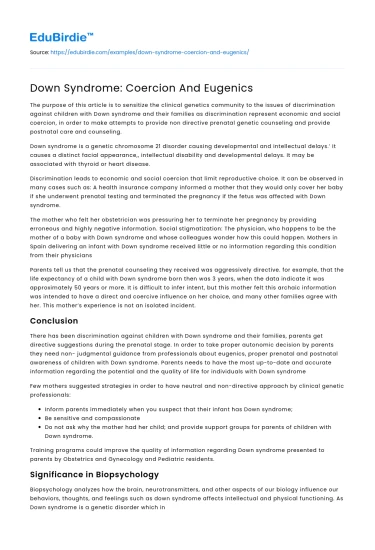The purpose of this article is to sensitize the clinical genetics community to the issues of discrimination against children with Down syndrome and their families as discrimination represent economic and social coercion, in order to make attempts to provide non directive prenatal genetic counseling and provide postnatal care and counseling.
Down syndrome is a genetic chromosome 21 disorder causing developmental and intellectual delays.’ It causes a distinct facial appearance,, intellectual disability and developmental delays. It may be associated with thyroid or heart disease.
Save your time!
We can take care of your essay
- Proper editing and formatting
- Free revision, title page, and bibliography
- Flexible prices and money-back guarantee
Discrimination leads to economic and social coercion that limit reproductive choice. It can be observed in many cases such as: A health insurance company informed a mother that they would only cover her baby if she underwent prenatal testing and terminated the pregnancy if the fetus was affected with Down syndrome.
The mother who felt her obstetrician was pressuring her to terminate her pregnancy by providing erroneous and highly negative information. Social stigmatization: The physician, who happens to be the mother of a baby with Down syndrome and whose colleagues wonder how this could happen. Mothers in Spain delivering an infant with Down syndrome received little or no information regarding this condition from their physicians
Parents tell us that the prenatal counseling they received was aggressively directive. for example, that the life expectancy of a child with Down syndrome born then was 3 years, when the data indicate it was approximately 50 years or more. It is difficult to infer intent, but this mother felt this archaic information was intended to have a direct and coercive influence on her choice, and many other families agree with her. This mother’s experience is not an isolated incident.
Conclusion
There has been discrimination against children with Down syndrome and their families, parents get directive suggestions during the prenatal stage. In order to take proper autonomic decision by parents they need non- judgmental guidance from professionals about eugenics, proper prenatal and postnatal awareness of children with Down syndrome. Parents needs to have the most up-to-date and accurate information regarding the potential and the quality of life for individuals with Down syndrome
Few mothers suggested strategies in order to have neutral and non-directive approach by clinical genetic professionals:
- Inform parents immediately when you suspect that their infant has Down syndrome;
- Be sensitive and compassionate
- Do not ask why the mother had her child; and provide support groups for parents of children with Down syndrome.
Training programs could improve the quality of information regarding Down syndrome presented to parents by Obstetrics and Gynecology and Pediatric residents.
Significance in Biopsychology
Biopsychology analyzes how the brain, neurotransmitters, and other aspects of our biology influence our behaviors, thoughts, and feelings such as down syndrome affects intellectual and physical functioning. As Down syndrome is a genetic disorder which involve the genetic component of biology. The process of Eugenics involves biology as well as biopsychology. Eugenics involves Improving the qualities of the human species, by means of discouraging reproduction by persons having genetic defects or presumed to have inheritable undesirable traits (negative eugenics) or encouraging reproduction by persons presumed to have inheritable desirable traits (positive eugenics).
Significance in real life
Prejudice and discrimination against individuals with Down syndrome continue today, including their families. There exist economic and societal influences before and after the birth of the child with Down syndrome. There have been reports by parents telling that the prenatal counseling they received was aggressively directive. For example, that the life expectancy of a child with Down syndrome born then was 3 years, when the data indicate it was approximately 50 years or more. It is difficult to infer intent, but this mother felt this archaic information was intended to have a direct and coercive influence on her choice, and many other families agree with her. This mother’s experience is not an isolated incident. Down syndrome is genetic it can happen to anybody’s fetus or newborn irrespective of caste, culture, profession, economic status etc.






 Stuck on your essay?
Stuck on your essay?

